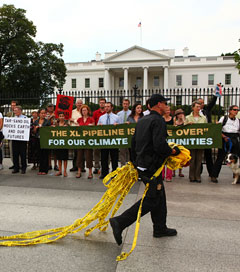Washington – With President Barack Obama facing fire from Republicans over the rising cost of gasoline, the White House moved quickly Monday to trumpet a Canadian company's decision to build a section of the controversial Keystone XL pipeline from Cushing, Okla., to Houston after Obama blocked a longer path last month.
Press Secretary Jay Carney hailed TransCanada's announcement and used it to counter Republican criticism that the administration has stifled oil and gas production. He said that the Oklahoma to Texas section of the pipeline would “help address the bottleneck of oil in Cushing that has resulted in large part from increased domestic oil production, currently at an eight-year high.”
The company's decision, Carney said, “highlights a little-known fact — certainly, you wouldn't hear it from some of our critics — that we approve, pipelines are approved and built in this country all the time.”
Obama's decision last month to reject the full 1,661-mile Keystone XL pipeline from Canada's tar sands has become a focal point of Republican efforts to portray him as responsible for the recent spike in gasoline prices, and they fault him for blocking a project they say would create jobs and reduce America's dependence on oil imports from unstable foreign sources.
The Republican speaker of the House of Representatives, John Boehner of Ohio, poked fun Monday at the White House salute of TransCanada's decision.
“The president is so far on the wrong side of the American people that he's now praising the company's decision to start going around him,” Boehner said in a statement to ABC News.
A recent national survey by the Pew Research Center for the People and the Press suggests that Obama's Keystone decision could become a political liability. Though 37 percent of those surveyed said they'd not heard of the pipeline, 66 percent of those who had heard of it said the government should approve it, while just 23 percent opposed it.
In fact, energy experts say that the Keystone XL pipeline wouldn't do much to lower gasoline prices. The recent price spike stems largely from speculators bidding up prices at a time of growing fear of future oil-supply disruptions if a war with Iran develops over its nuclear program.
TransCanada will be the second pipeline moving oil from Cushing to the Gulf Coast. The other is already built and owned by Enbridge Inc. The two pipelines will reduce the glut of oil in the Midwest “and in doing so will raise the price of oil in Cushing and the Midwest and will lower the price very slightly in the rest of the world,” said Severin Borenstein, a professor at the Haas School of Business at the University of California, Berkeley.
Prices in the Midwest could go up between 10 and 30 cents a gallon, ending the region's cheaper gasoline compared to other areas, he said. If the full pipeline is constructed, the impact on world oil prices would “never really be noticed” because it would be so small, a few cents or less per gallon, that it would be “lost in the noise of other changes.”
TransCanada also told the State Department on Monday that it plans to submit a new application for the rejected segment of the pipeline, and Carney said the president's rejection last month “in no way prejudged future applications.”
The White House contends that House Republicans forced Obama to reject the earlier cross-border application by not giving it enough time to review the project.
Republicans accuse Obama of putting off the decision until after the 2012 elections so as not to upset environmentalists.
Environmental groups made the pipeline a test of Obama's will to move the country off fossil fuels and to slow climate change. They also say the pipeline would put the Ogalalla Aquifer, streams, farms and wildlife habitat at greater risk of oil spills.
Kim Huynh of Friends of the Earth said in a statement Monday that the pipeline would be an “environmental disaster” and called the administration's welcome of TransCanada's plan “an alarming about-face.”
“The administration must stop trying to have it both ways,” Huynh said. “President Obama cannot expect to protect the climate and to put the country on a path toward 21st century clean energy while simultaneously shilling for one of the dirtiest industries on Earth.”
© 2012 McClatchy-Tribune Information Services
Truthout has licensed this content. It may not be reproduced by any other source and is not covered by our Creative Commons license.
Speaking against the authoritarian crackdown
In the midst of a nationwide attack on civil liberties, Truthout urgently needs your help.
Journalism is a critical tool in the fight against Trump and his extremist agenda. The right wing knows this — that’s why they’ve taken over many legacy media publications.
But we won’t let truth be replaced by propaganda. As the Trump administration works to silence dissent, please support nonprofit independent journalism. Truthout is almost entirely funded by individual giving, so a one-time or monthly donation goes a long way. Click below to sustain our work.
